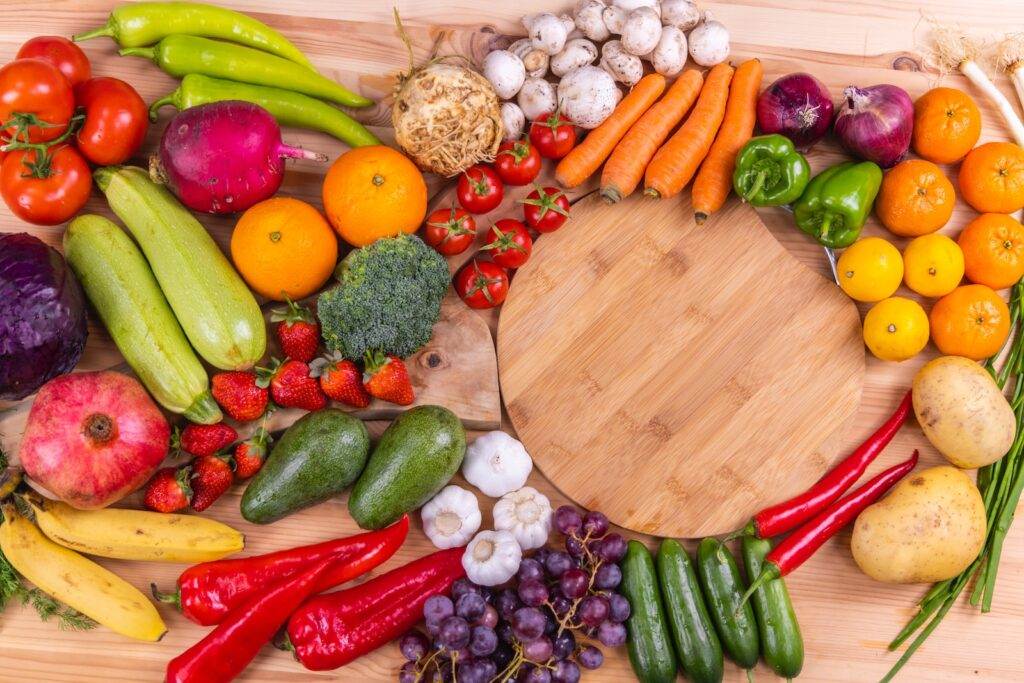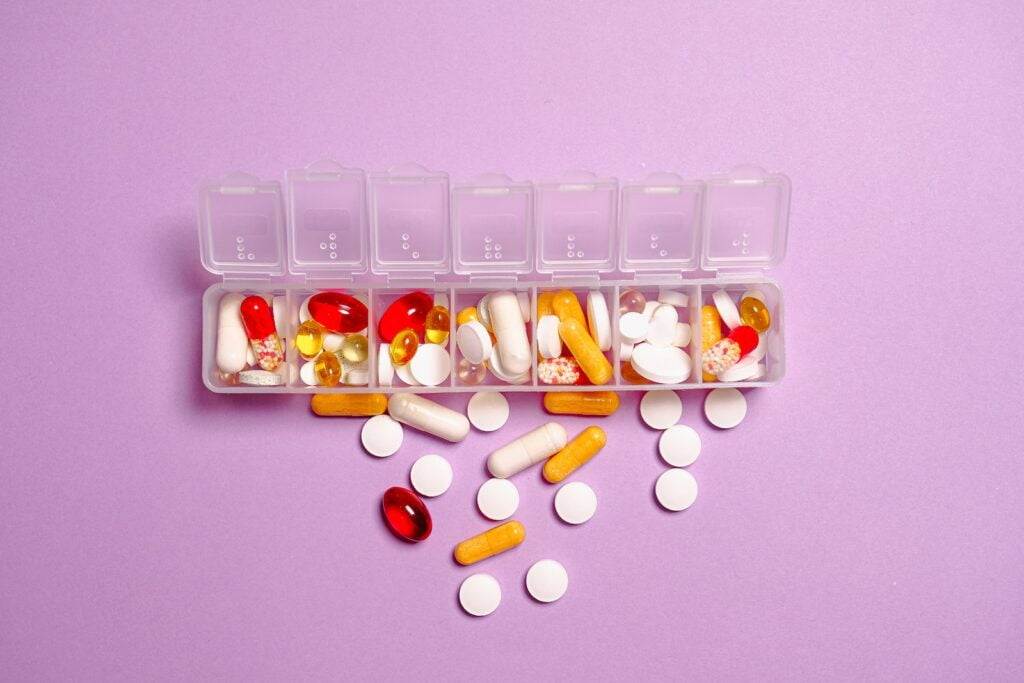Vitamins A, B, C, D, and E, as well as iron, zinc, and selenium, are among the nutrients and vitamins discussed in this article that are necessary for healthy hair growth. It describes each vitamin’s role in hair growth and provides recommended dietary intakes and food sources. In addition, the article stresses the importance of a balanced diet and healthy lifestyle for hair health. Before making major diet or supplement changes, consult a healthcare professional for best results.
Table of Contents
Overview of Hair Growth Cycle
Hair grows in cycles. Anagen, Catagen, Telogen, and Exogen are the hair growth phases. Each hair on the scalp progresses through these stages independently of the others, ensuring that we maintain a full head of hair at any given time.
Understanding hair growth stages helps identify hair loss issues and develop effective hair care strategies. Age, genetics, hormones, nutrition, and health all affect hair growth. Maintaining a balanced diet and healthy lifestyle can help your hair grow and stay healthy throughout the hair growth cycle.
Stages of Hair Growth
Anagen Phase (Growth Phase)
The Anagen phase is the active growth stage of the hair cycle, during which cells in the hair bulb divide rapidly, forming the hair shaft. Hair grows about half an inch (1.25 cm) per month on average, with a total growth of around 6 inches (15 cm) per year. The length of the Anagen phase varies between individuals and is influenced by genetics, hormones, and other factors. This phase can last anywhere from 2 to 7 years for scalp hair.
Catagen Phase (Transition Phase)
The Catagen phase is a relatively short transitional stage that lasts about 2 to 3 weeks. During this phase, hair growth ceases, and the hair follicle starts to shrink, detaching itself from the blood supply. The hair becomes what is known as a “club hair” as it prepares for the shedding process. Approximately 3% of all hairs are in the Catagen phase at any given time.
Telogen Phase (Resting Phase)
The Telogen phase is the resting stage of the hair cycle, lasting approximately 3 months. During this time, the hair follicle remains inactive, and the club hair is fully formed. Roughly 6-8% of all hairs are in the Telogen phase at any given time. Hair shedding is normal during this phase, with an average person losing around 50-100 hairs per day.
Exogen Phase (Shedding Phase)
The Exogen phase is the shedding stage of the hair cycle, during which club hairs are released and fall out. This phase overlaps with the other stages of the hair growth cycle, as new hairs in the Anagen phase push out the old club hairs. The Exogen phase is a natural part of the hair growth process, and losing hairs during this stage is normal.
Factors Affecting Hair Growth
Now that we’ve covered the basics of the hair growth cycle, it’s crucial to acknowledge that several factors can influence hair growth. These include genetics, hormones, stress levels, nutrition, and overall health. While we can’t change our genes, we can certainly control our diet and lifestyle to create the ideal environment for healthy hair growth.
So, now that we’ve laid the groundwork, it’s time to explore the magical world of essential vitamins and their role in achieving the long, strong, and gorgeous hair of your dreams. Onward, hair enthusiasts!

Essential Vitamins for Hair Growth
It’s time to explore the world of essential vitamins and their miraculous roles in promoting healthy hair growth! Discover how your new BFFs (best follicle friends) can help you attain the luscious locks you’ve always desired.
Vitamin A
1. Role in Hair Growth
Vitamin A is like the fairy godmother of hair growth, playing a vital role in keeping your hair moisturized and supporting the production of sebum (your scalp’s natural oil). Without enough vitamin A, your hair may become dry, brittle, and prone to breakage.
2. Recommended Dietary Intake
The daily recommended intake of vitamin A varies by age and sex1Vitamin A and Carotenoids:
- Adult men: 900 mcg RAE (3,000 IU)
- Adult women: 700 mcg RAE (2,300 IU)
Note: Pregnant women and nursing mothers have different requirements, so be sure to consult your healthcare provider.
3. Food Sources
Here are some vitamin A-rich foods to add to your menu:
- Sweet potatoes
- Carrots
- Spinach
- Kale
- Cantaloupe
B-Vitamins
1. Biotin
a. Role in Hair Growth
Biotin2Biotin is the hair growth superstar of the B-vitamin family. It helps convert food into energy and plays a crucial role in the production of keratin, the protein that makes up your hair, skin, and nails.
b. Recommended Dietary Intake
The daily recommended intake of biotin varies by age and sex:
- Adult men and women: 30 mcg
Note: Pregnant women and nursing mothers have different requirements, so be sure to consult your healthcare provider.
c. Food Sources
Biotin-rich foods to consider include:
- Eggs (especially the yolks)
- Almonds
- Spinach
- Salmon
- Sweet potatoes
2. Other B-Vitamins and Their Roles
a. Vitamin B6
Vitamin B6 supports healthy hair growth by helping the body synthesize keratin and melanin (the pigment that gives your hair its color).
b. Vitamin B12
Vitamin B12 is essential for red blood cell production, which carries oxygen to your hair follicles, promoting healthy hair growth.
c. Folic Acid
Folic acid aids in cell growth and division, contributing to the renewal of hair follicles and promoting hair growth.
d. Niacin
Niacin (vitamin B3) helps maintain healthy hair by improving scalp circulation and promoting the delivery of nutrients to hair follicles.
Vitamin C
1. Role in Hair Growth
Vitamin C3Vitamin C is the ultimate multitasker when it comes to hair growth. It helps your body produce collagen, a protein that provides structure to your hair, and aids in iron absorption, which is essential for hair growth.
2. Recommended Dietary Intake
The daily recommended intake of vitamin C varies by age and sex:
- Adult men: 90 mg
- Adult women: 75 mg
Note: Smokers, pregnant women, and nursing mothers have different requirements, so be sure to consult your healthcare provider.
3. Food Sources
Here are some vitamin C-rich foods to enjoy:
- Citrus fruits (oranges, grapefruits, lemons)
- Kiwi
- Strawberries
- Pineapple
- Bell peppers

Vitamin D
1. Role in Hair Growth
Vitamin D is believed to play a role in hair follicle health and function, which could impact hair growth. While research is still ongoing, vitamin D deficiencies have been linked to hair loss and slowed hair growth4Amor KT, Rashid RM, Mirmirani P. Does D matter? The role of vitamin D in hair disorders and hair follicle cycling. Dermatol Online J. 2010;16(2):3.
2. Recommended Dietary Intake
The daily recommended intake of vitamin D varies by age:
- Adults up to age 70: 15 mcg (600 IU)
- Adults over age 70: 20 mcg (800 IU)
Note: Pregnant women and nursing mothers have different requirements, so be sure to consult your healthcare provider5Institute of Medicine. 2011. Dietary Reference Intakes for Calcium and Vitamin D. Washington, DC: The National Academies Press..
3. Food Sources
Vitamin D is known as the “sunshine vitamin” because your body can produce it when your skin is exposed to sunlight. However, you can also find it in these food sources:
- Fatty fish (salmon, mackerel, sardines)
- Cod liver oil
- Fortified dairy products and plant-based milks
- Egg yolks6National Institutes of Health. 2021. Vitamin D. Office of Dietary Supplements. https://ods.od.nih.gov/factsheets/VitaminD-HealthProfessional/
Vitamin E
1. Role in Hair Growth
Vitamin E is like the guardian angel of your hair, protecting it from free radicals and environmental damage that can lead to breakage and hair loss. This antioxidant powerhouse also helps to improve scalp circulation, delivering nutrients to hair follicles for optimal growth7Keen MA, Hassan I. Vitamin E in dermatology. Indian Dermatol Online J. 2016;7(4):311-314..
2. Recommended Dietary Intake
The daily recommended intake of vitamin E is the same for adult men and women:
- Adults: 15 mg (22.4 IU)
Note: Pregnant women and nursing mothers have different requirements, so be sure to consult your healthcare provider8National Institutes of Health. 2021. Vitamin E. Office of Dietary Supplements. https://ods.od.nih.gov/factsheets/VitaminE-HealthProfessional/.
3. Food Sources
Here are some vitamin E-rich foods to incorporate into your diet9National Institutes of Health. 2021. Vitamin E. Office of Dietary Supplements. https://ods.od.nih.gov/factsheets/VitaminE-Consumer/:
- Almonds
- Sunflower seeds
- Spinach
- Avocado
- Wheat germ oil
Now that you’re armed with the knowledge of these essential hair growth vitamins, it’s time to get your hair game on! Remember, a balanced diet is the key to optimal hair growth, so make sure you’re feeding your follicles with all the nutrients they need to thrive. Happy hair-growing!

Potential Side Effects and Risks of Excessive Vitamin Intake
Vitamins are important for health, but too much can be bad. Vitamin overdose can cause side effects and interact with medications. We discuss vitamin overdose and drug interactions here.
Vitamin A
- Overconsumption of vitamin A can lead to a condition called hypervitaminosis A, which may cause symptoms such as dizziness, nausea, headaches, and even hair loss.
- Extremely high doses of vitamin A can be toxic, potentially causing serious side effects, including liver damage, bone loss, and birth defects in pregnant women.
- Vitamin A can interact with certain medications, such as retinoids (used for acne and psoriasis) and some cholesterol-lowering drugs, potentially increasing the risk of toxicity.
B-Vitamins
- Generally, B-vitamins are considered safe, even in high doses, because they are water-soluble and excess amounts are excreted through urine. However, excessive intake of certain B-vitamins can still cause side effects.
- For instance, excessive vitamin B6 can lead to nerve damage, while high doses of niacin (vitamin B3) may cause flushing, itching, and liver damage.
- B-vitamins can interact with certain medications, such as some anticonvulsants, which may reduce the effectiveness of the medication or increase the risk of side effects.
Vitamin C
- While vitamin C is generally safe, excessive intake can lead to gastrointestinal issues, such as diarrhea, nausea, and stomach cramps.
- Extremely high doses of vitamin C can increase the risk of kidney stones, particularly in individuals with a history of kidney problems.
- Vitamin C can interact with some medications, including certain blood thinners and cancer treatments, potentially affecting the medication’s efficacy or causing side effects.
Vitamin D
- Overconsumption of vitamin D can lead to a condition called hypervitaminosis D, which may result in symptoms such as nausea, vomiting, weakness, and kidney problems.
- Excessive vitamin D intake can also cause elevated blood calcium levels, potentially leading to calcification of blood vessels and organs, and bone loss.
- Vitamin D can interact with certain medications, such as antacids, blood pressure medications, and some corticosteroids, potentially affecting the medication’s effectiveness or increasing the risk of side effects.
Vitamin E
- Generally, vitamin E is considered safe when consumed within the recommended dietary intake. However, high doses can cause side effects such as nausea, diarrhea, and an increased risk of bleeding.
- Excessive vitamin E intake may interfere with blood clotting and should be used cautiously by individuals taking blood-thinning medications, such as warfarin.
- Vitamin E can also interact with certain medications, including chemotherapy drugs and statins, potentially reducing their effectiveness.
Essential vitamins should be taken within the recommended dietary intake and discussed with a doctor before use, especially if you are taking medications or have pre-existing health conditions. Remember, a balanced diet provides the best nutrients for health and hair growth.
Additional Minerals and Nutrients for Hair Growth
While our vitamin superheroes play a starring role in the hair growth saga, they can’t do it alone. Let’s meet the mighty minerals and nutrients that provide essential backup in the quest for fabulous hair.
Iron: The Hair Growth Guardian
Iron is like the guardian angel of hair growth, ensuring your hair follicles receive a steady supply of oxygen and nutrients. Without enough iron, your hair may become weak and lifeless, resulting in slow growth or even hair loss.
Food for Thought: Iron Sources
To keep your hair growth guardian on duty, incorporate iron-rich foods like spinach, lentils, red meat, and fortified cereals into your diet.
Zinc: The Balancer
Zinc is the ultimate balancer, helping to regulate hormones and maintain a healthy scalp environment. It’s like the zen master of hair growth, ensuring everything stays in harmony.
Food for Thought: Zinc Sources
Stay zen with zinc by enjoying foods like oysters, pumpkin seeds, chickpeas, and dark chocolate. Namaste, hair growth!
Selenium: The Protector’s Sidekick
Selenium may not be the star of the show, but it’s a crucial sidekick to our protector, vitamin E. Working together, they shield your hair from damage and keep your scalp healthy.
Food for Thought: Selenium Sources
Power up your protective duo with selenium-rich foods like Brazil nuts, tuna, and sunflower seeds.
Omega-3 Fatty Acids: The Nourishers
Omega-3 fatty acids are the unsung heroes of hair growth, providing essential nourishment and hydration to your hair and scalp. Think of them as the ultimate hair care power couple, keeping your locks moisturized and strong.
Food for Thought: Omega-3 Fatty Acids Sources
To keep your hair well-nourished, indulge in omega-3-rich foods like salmon, chia seeds, walnuts, and flaxseeds. Your hair will love the hydration boost!
Protein: The Building Blocks
Without protein, our hair growth story would be a tragic tale. Protein is the building block of hair, as it’s made up of keratin—a type of protein. Skimping on protein is like trying to build a castle without bricks—it just won’t work!
Food for Thought: Protein Sources
Ensure your hair has the building blocks it needs by including protein-rich foods like chicken, tofu, beans, and Greek yogurt in your diet. Your hair will stand tall and strong, like the castle of your dreams.
Silica: The Unsung Hero
Silica might not be a household name, but it plays a vital role in maintaining hair elasticity and strength. This unsung hero works behind the scenes to keep your hair looking its best.
Food for Thought: Silica Sources
Give silica the recognition it deserves by incorporating foods like cucumbers, oats, and bananas into your diet. Your hair will be eternally grateful for the extra support!

Signs of Vitamin Deficiencies and Hair Problems
Now that we’ve explored the all-star cast of essential vitamins, minerals, and nutrients that promote hair growth, it’s important to recognize the signs of deficiencies that may be sabotaging your hair goals. Let’s delve into the common symptoms of vitamin deficiencies and the hair issues that may arise as a result.
Common Symptoms of Vitamin Deficiencies
Vitamin and nutrient deficiencies can manifest in many ways, from fatigue and mood swings to skin problems and, you guessed it, hair troubles. Paying attention to these signs can help you course-correct before your hair suffers the consequences.
Hair Issues Associated with Nutrient Deficiencies
When your body lacks the essential vitamins and nutrients it needs, your hair may send out an SOS in the form of various hair problems. Let’s examine some of the most common hair issues that may be a cry for help from your locks:
1. Hair Loss
If you find yourself shedding more than a furry pet, you might be experiencing hair loss due to nutrient deficiencies. Low levels of iron, vitamin D, and zinc can all contribute to hair loss, so keep an eye on your nutrient intake10Almohanna, H. M., Ahmed, A. A., Tsatalis, J. P., & Tosti, A. (2019). The role of vitamins and minerals in hair loss: a review. Dermatology and Therapy, 9(1), 51-70..
2. Slow Hair Growth
Does it feel like your hair has hit the brakes on growth? Slow hair growth can be a sign of inadequate biotin, vitamin A, or protein in your diet. Time to fuel up and get your hair back on the fast track!
3. Brittle Hair
When your hair feels more fragile than a house of cards, it could be due to a lack of essential vitamins like vitamin C or vitamin E, or even a deficiency in protein. By boosting these nutrients in your diet, you can help fortify your hair and make it more resilient.
4. Dry Scalp and Dandruff
A dry, itchy scalp and dandruff can be the bane of your hair’s existence. These issues may indicate a deficiency in vitamin A or omega-3 fatty acids, both of which help keep your scalp moisturized and healthy. Time to up the ante on those nutrients and kiss dandruff goodbye!
5. Split Ends
Split ends are like the unwanted party crashers of hair growth. They often result from a lack of essential nutrients like vitamin C, protein, and silica. By nourishing your hair with these vital elements, you can help prevent split ends and keep your hair looking fabulous.
Supplements vs. Food Sources
As we navigate the wild world of hair growth, a question arises: Should we rely on supplements or whole food sources to fuel our hair’s needs? In this epic showdown, let’s explore the advantages and disadvantages of supplements, the importance of whole food sources, and tips for choosing a high-quality supplement if you decide to go that route.
Advantages and Disadvantages of Supplements
Supplements can be a convenient way to fill in the gaps in your diet and ensure you’re getting all the essential vitamins and nutrients your hair craves. However, they come with their own set of pros and cons:
Pros:
- Targeted nutrient intake: Supplements can help you zero in on specific nutrients you may be lacking.
- Convenience: Taking a supplement can be quicker and easier than preparing a meal.
Cons:
- Overdosing risks: It’s possible to consume too much of a nutrient, which can lead to negative side effects.
- Less bioavailability: Some nutrients are better absorbed from food sources than from supplements.
Importance of Whole Food Sources
While supplements can be helpful, they should never replace a balanced diet of whole food sources. Food sources provide a synergistic blend of nutrients that work together to promote overall health, including hair growth. Plus, they come with added benefits like fiber, antioxidants, and flavor!
Tips for Choosing a High-Quality Supplement
If you decide to use supplements to support your hair growth journey, it’s essential to choose a high-quality product. Here are some tips to help you make an informed decision:
- Research: Investigate the supplement’s ingredients and manufacturing process to ensure quality and safety.
- Third-party testing: Look for products that have been tested and verified by independent third parties for purity and potency.
- Read reviews: Check out user reviews and testimonials to learn about other people’s experiences with the supplement.
- Avoid fillers and artificial additives: Opt for supplements with minimal fillers and no artificial colors or flavors.
Consulting a Healthcare Professional
Before starting any new supplement regimen, it’s wise to consult a healthcare professional, like a doctor or registered dietitian. They can help you assess your nutrient needs, recommend the right dosage, and monitor your progress to ensure you’re on the right track to healthy hair growth.

Conclusion
Well, my fellow hair enthusiasts, we’ve reached the end of our vitamin-fueled journey to hair growth nirvana. Before we part ways, let’s recap the highlights and set the stage for your own fabulous hair adventure.
Summary of Key Points
- Vitamins like A, B (especially biotin), C, D, and E are essential for hair growth and health.
- Additional minerals and nutrients like iron, zinc, selenium, omega-3 fatty acids, protein, and silica also play crucial roles in supporting your locks.
- Pay attention to the signs of vitamin deficiencies and hair problems, and adjust your diet accordingly to address any issues.
- Balance is key: prioritize whole food sources for your nutrients, and consider supplements when necessary (with guidance from a healthcare professional).
Encouragement for a Healthy Lifestyle and Diet for Optimal Hair Growth
Your hair is a reflection of your overall health, and a balanced diet, combined with a healthy lifestyle, is the secret recipe for luscious locks. Embrace the knowledge you’ve gained, nourish your body with nutrient-rich foods, and indulge in self-care to create the perfect environment for optimal hair growth.
FAQs
Q: How long will it take to see results from improving my diet and taking supplements?
Rome wasn’t built in a day, and neither will your luscious locks! Hair growth takes time, and results can vary from person to person. Generally, you can expect to see improvements in your hair health and growth within 3-6 months of implementing dietary changes and supplements. Just remember to be patient and consistent.
Q: Can I just take a multivitamin and call it a day?
While a multivitamin can be a convenient way to fill in some nutritional gaps, it may not provide the optimal levels of specific essential vitamins and nutrients your hair craves. It’s best to focus on a balanced diet and consider targeted supplements if needed (with guidance from a healthcare professional, of course!).
Q: Can I overdo it with vitamins and supplements?
Yes, you can have too much of a good thing. Overdosing on certain vitamins and minerals can lead to negative side effects and even hair loss in some cases. It’s crucial to follow recommended dosages and consult a healthcare professional before starting any new supplement regimen.
Q: Are there any hair care practices that can support my hair growth journey?
Absolutely! In addition to nourishing your body from within, adopting healthy hair care practices can help you achieve your hair goals. Here are some tips:
Be gentle when detangling to avoid breakage.
Minimize heat styling and chemical treatments.
Trim your ends regularly to prevent split ends.
Use a sulfate-free shampoo and nourishing conditioner.
Protect your hair from sun damage with a hat or UV-protective spray.
Q: Can stress impact my hair growth?
Stress can wreak havoc on your overall health, including your hair. It can trigger hair loss, slow down hair growth, and cause hair to become dull and lifeless. So, take a deep breath, practice self-care, and consider stress management techniques like meditation or exercise to keep stress at bay.
Q: Are there any specific foods I should include in my diet for optimal hair growth?
To give your hair the best nutritional support, focus on a balanced diet rich in whole foods. Here are some hair-friendly superstars to include:
Leafy greens (for iron and vitamin A)
Nuts and seeds (for vitamin E and zinc)
Fatty fish (for omega-3 fatty acids and vitamin D)
Eggs (for biotin and protein)
Sweet potatoes (for vitamin A and beta-carotene)
Citrus fruits (for vitamin C)

